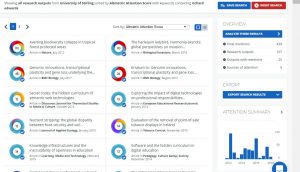Published by Professor Richard Edwards
In 1993, the French philosopher Jacques Derrida published Spectres of Marx. In his discussion of the ‘death’ of communism following the collapse of the Berlin Wall in 1989, he developed the notion of hauntology and argued for the importance of the spectre or ghost in the world. Communism wasn’t dead as the spectre of communism would continue to haunt the world, an idea put forward by Marx in the Communist Manifesto of 1848. Derrida, often labelled a postmodernist, was laying claim to working with the Marxist tradition, something which enraged many more traditional Marxists.

Derrida’s notion of hauntology is based upon his wider work on deconstruction. There are many accounts of deconstruction, including that by Robin Usher and myself in Postmodernism and Education from 1994. Simplistically, hauntology contrasts a view of the world as having origins that lead to the present, with one where we are haunted by ghosts – absent-presences, neither alive nor dead. In other words, the present is never simply present, but is haunted by the past and future imaginings.
I was reminded of Derrida’s hauntology recently when I opened my email. I retired from academic work as a Professor of Education nearly two years ago. As a person, I am no longer present in the world of research. I no longer walk the corridors of universities. I am absent. And yet my email constantly informs me of articles, books and chapters that continue to be cited by other researchers in different domains and different parts of the world. The algorithms of ResearchGate, Academic.edu, etc. mine the digital world of research and identify me as the author of certain texts. They curate this information and send it to me. Pretty much daily I am informed that my research has been cited by another researcher or that X (where X is anywhere between 1 and 100) research texts have cited my work. It seems then that, although absent, I remain present to the world of research. I am an absent-presence, haunting the world of research, a ghost.
I have become used to deleting such information as it arrives in my Inbox. But then I was sent a copy of an article reporting research by colleagues in the world of adult education. The research was a citation study of a number of journals that focus on workplace learning, as important aspect of adult education. It sat in my Inbox for several days unopened. While I am suspicious of the value of such studies and what they do or do not show – citation does not necessarily signify influence and people sometimes cite without fully reading what they are citing – I am not immune to the vanities of research and wanting to influence others – hopefully in a positive direction. This suggests I am a reluctantly vain ghost!

Interest or vanity led me eventually to open and read the article. And much to my shameless pleasure, I noted that I was heavily cited in the journals covered by the research. And not just me. Two other Emeritus Professors from Stirling – Tara Fenwick and John Field – also featured heavily. We share a ghostly existence in our retirement. We haunt particular parts of the world of research.
Musing on ghostliness is not an entirely new pastime for me. I have long argued against zombie academic culture. Zombie academics are those who continue to remain with the living research culture long after they are dead to it, contributing little or nothing to research. It was not wanting to become a zombie academic that, in part, led to my decision to retire when I did.
I realise my notion does not do full justice to the notion of the zombie. Nor is a zombie the same as a ghost. Anthropologically, zombies are the dead who are brought back to life in bodily form but without a soul. They are the absent made present again, brought to life by others and having no will of their own. In popular culture, zombies take many different forms and have various characteristics. Zombie academics are not always brought back to life by others, but they do lack the soul to realise their zombie existence.
Ghosts and zombies; what’s the difference? Which best characterises the continued citation of research post-retirement? I want to defer an answer to such questions because there is an undecidability in considering the practises of research. And, to return to Derrida, that is the point. But, for what it is worth, I find the notion of ghostly haunting more satisfying when considering my own absent-presence in research than the more terrifying presence of the zombie. Some of the ways in which my research, alone and with others, is cited terrifies me, which suggests I do not embody the soulless terror of the zombie. In musing on citations in research, I find myself a ghost, an absent-presence, neither alive nor dead to research, even as I no longer engage in academic work, attend conferences, publish, engage in all the things that researchers do. Continued citation leaves traces. Ooooooooooh!
About the author
 Richard Edwards is Emeritus Professor within the Faculty of Social Sciences. He has researched and published extensively on adult and further education, and lifelong learning drawing upon post-structuralist and socio-materialist theories. His academic background was in the areas of philosophy and history before beginning a career in adult education. Prior to joining the University of Stirling in 2001, he worked at the Open University, UK. Between 2006 and 2013 he was Head of the School of Education. He retired in 2016, but his publications live on and he is active on social media. Read more.
Richard Edwards is Emeritus Professor within the Faculty of Social Sciences. He has researched and published extensively on adult and further education, and lifelong learning drawing upon post-structuralist and socio-materialist theories. His academic background was in the areas of philosophy and history before beginning a career in adult education. Prior to joining the University of Stirling in 2001, he worked at the Open University, UK. Between 2006 and 2013 he was Head of the School of Education. He retired in 2016, but his publications live on and he is active on social media. Read more.